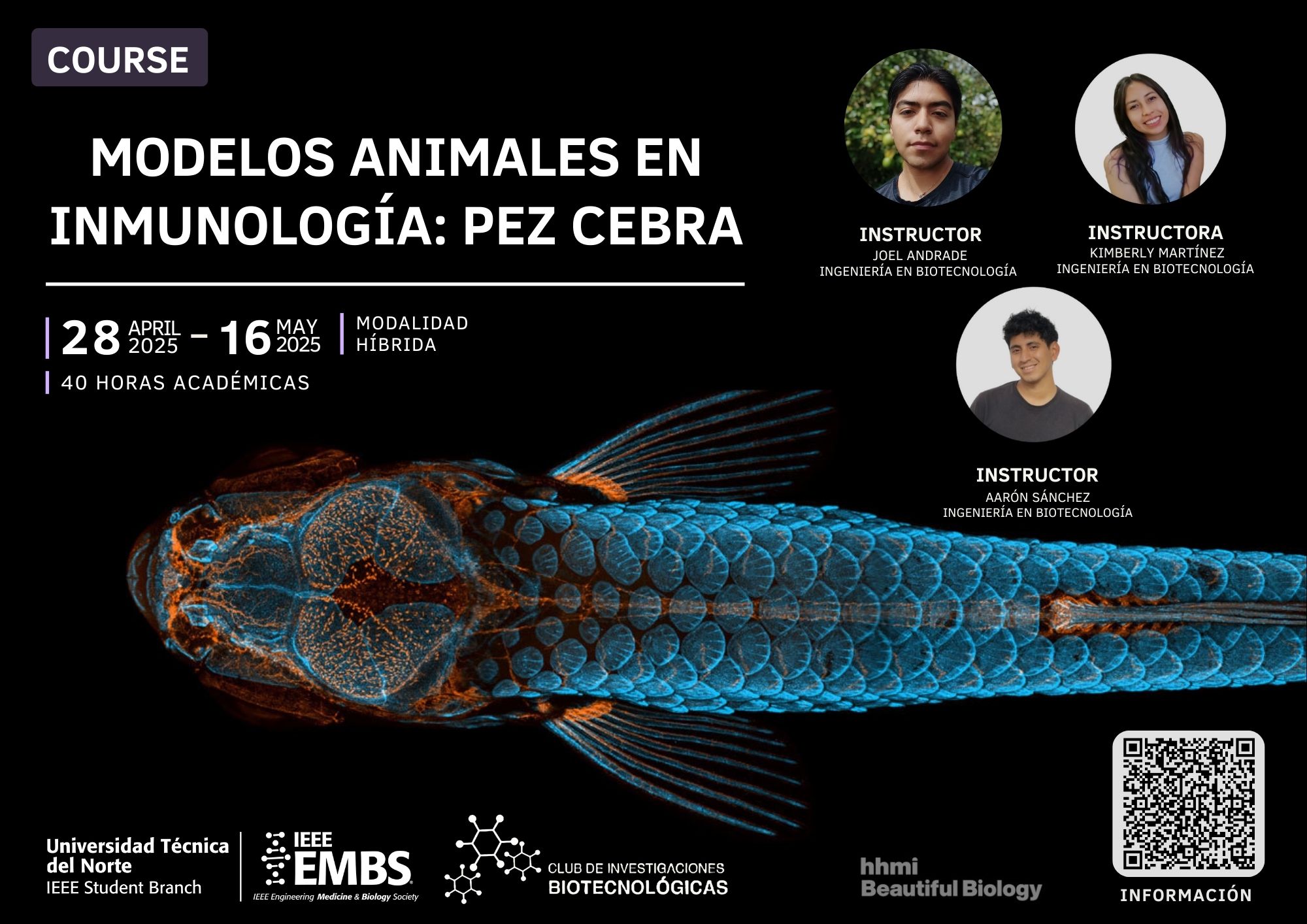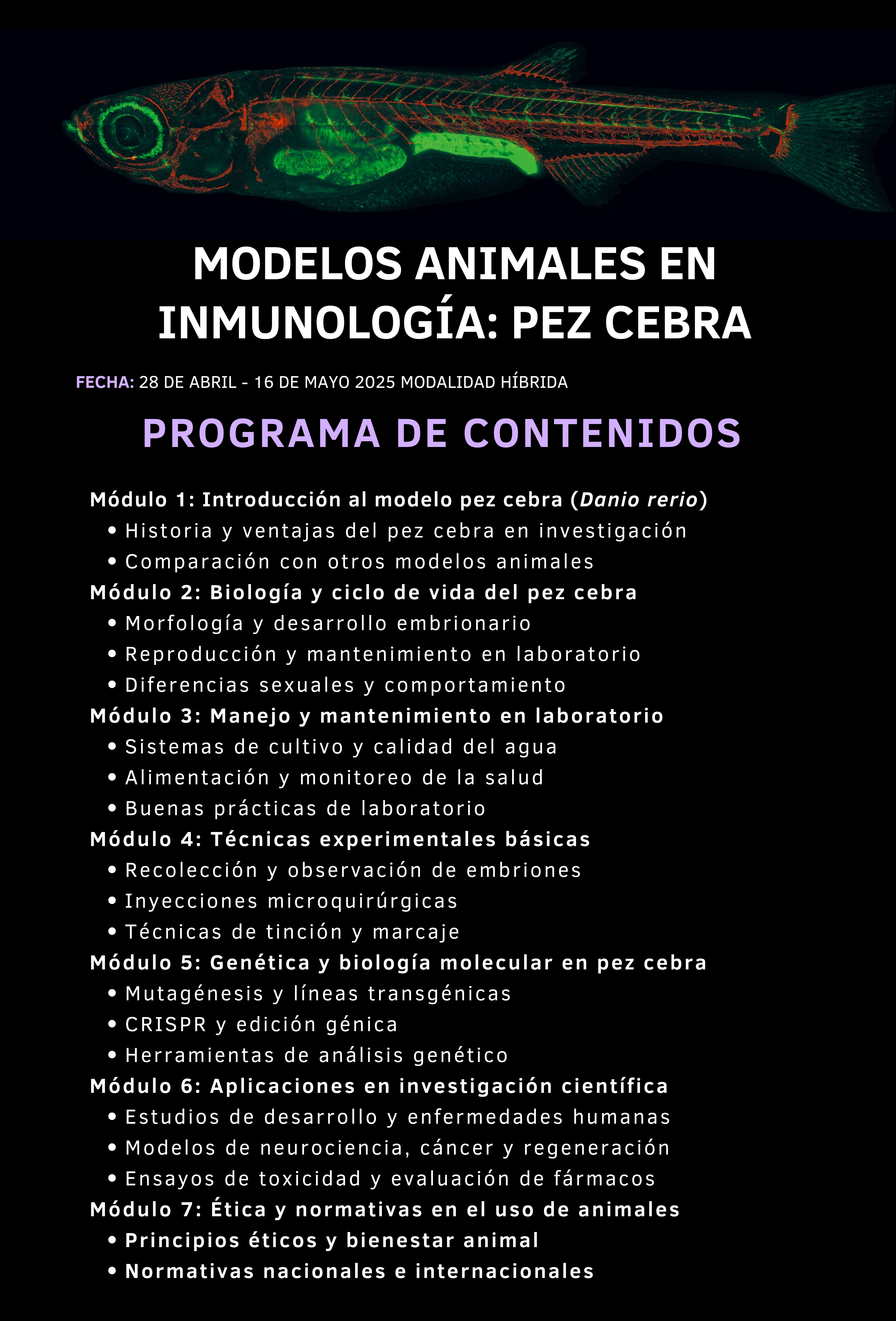CURSO DE MODELOS ANIMALES EN INMUNOLOGÍA: PEZ CEBRA
Te invitamos a participar en este curso teórico-práctico diseñado para estudiantes, docentes e investigadores interesados en el uso del pez cebra (Danio rerio) como modelo en estudios biológicos, biomédicos y toxicológicos. El pez cebra se ha convertido en una herramienta clave en la investigación científica por su fácil mantenimiento, rápido desarrollo embrionario y gran similitud genética con los seres humanos.
Durante el curso, exploraremos desde aspectos básicos de su biología y manejo en laboratorio, hasta técnicas experimentales como microinyección, observación embrionaria, y creación de líneas transgénicas. Además, abordaremos temas de genética, biología molecular, aplicaciones en el estudio de enfermedades humanas y ensayos de toxicidad. También discutiremos la ética y las normativas en el uso de animales en investigación.
Date and Time
Location
Hosts
Registration
- Start time: 29 Apr 2025 12:00 AM UTC
- End time: 16 May 2025 09:00 PM UTC
-
 Add Event to Calendar
Add Event to Calendar
- Av, 17 de julio 5-21
- Gral. José María
- Ibarra, Imbabura
- Ecuador
- Building: CAI
- Contact Event Host
- Co-sponsored by Club de Investigaciones Biotecnológicas - UTN
- Survey: Fill out the survey
Speakers
AARON SANCHEZ of UNIVERSIDAD TECNICA DEL NORTE
Genetics and applications of zebrafish
This presentation addresses the role of the zebrafish (Danio rerio) as a model organism in genetic studies and its growing importance in biomedical and biotechnological research. The genetic characteristics that make it an ideal model will be explored, such as its high degree of genetic homology with humans, its rapid embryonic development, and its transparency during the early stages of development. The presentation will include a review of the genetic techniques used in this organism, such as CRISPR-Cas9 gene editing, RNA and DNA microinjection, and mutant analysis. Additionally, its applications in areas such as biomedicine, environmental toxicology, neuroscience, and the development of gene therapies will be discussed. The presentation seeks to highlight the potential of the zebrafish as a versatile tool for understanding human diseases, evaluating bioactive compounds, and advancing modern biotechnology.
Biography:
Biotechnology Engineering student with an outstanding academic profile and over a year of scientific research experience focused on the biological model Danio rerio (zebrafish). She has actively participated in laboratory projects related to developmental biology, genetics, and environmental toxicology, demonstrating advanced skills in microinjection techniques, embryo handling, and phenotypic analysis. Her commitment to research is reflected in her ability to work independently and collaboratively, as well as in her participation in student conferences and specialized seminars. She possesses a solid theoretical and practical background, standing out for her scientific curiosity, critical thinking, and high ethical sense in experimental work.
Email:
Address:IBARRA, Ecuador
JOEL ANDRADE of UNIVERSIDAD TECNICA DEL NORTE
Maintaining zebrafish in laboratory conditions
This presentation offers a comprehensive overview of essential practices for the proper maintenance of zebrafish (Danio rerio) as a model organism in scientific research settings. Key aspects related to the installation and management of water recirculation systems, the control of physicochemical parameters (temperature, pH, conductivity, and water quality), as well as cleaning routines, health monitoring, and reproductive management will be addressed.
The nutritional needs of zebrafish and strategies for preparing and administering balanced feed will also be discussed, considering the different developmental stages (larvae, juveniles, and adults). The presentation will also include recommendations on population density, light-dark cycles, environmental enrichment, and good animal welfare practices.
Aimed at students, laboratory technicians, and researchers, this presentation seeks to strengthen technical knowledge and promote optimal conditions for the breeding, care, and ethical use of this species in experimental settings.
Biography:
Joel Andrade is a Biotechnology Engineering student with a solid background in molecular biology, genetics, and animal nutrition. Throughout his academic career, he has gained extensive experience maintaining zebrafish (Danio rerio) colonies, working in reproductive management, monitoring physicochemical water parameters, and sanitary control.
He has developed and optimized specific balanced feed formulations for the different stages of the zebrafish life cycle, considering the species' nutritional and physiological requirements. His work has focused on improving the quality of life and reproductive performance of specimens used in research, applying principles of biochemistry, microbiology, and food biotechnology.
He has also collaborated on research projects focused on developmental genetics and the evaluation of bioactive compounds through bioassays in model fish. His interests lie in innovation in aquatic culture systems, laboratory animal welfare, and the application of biotechnology to improve experimental models.
Email:
Address:IBARRA, Ecuador
KIMBERLY MARTINEZ of UNIVERSIDAD TECNICA DEL NORTE
Legal Framework and Bioethics of the Zebrafish
This presentation addresses the legal and bioethical foundations that regulate the use of the zebrafish (Danio rerio) as a model organism in scientific research. A review of the main national and international regulations that establish criteria for the handling, care, and experimentation with aquatic vertebrates will be presented, with an emphasis on compliance with ethical protocols and the application of the 3Rs principle (Replacement, Reduction, and Refinement).
The presentation will also include reflections on the moral implications of the use of animals in science, the role of research ethics committees, and the responsibility of researchers in protecting animal welfare. Case studies and recommendations for developing projects involving the use of zebrafish will be analyzed, ensuring their alignment with current ethical and legal standards.
Aimed at students, faculty, and researchers, this presentation seeks to strengthen ethical awareness and foster a scientific culture committed to respecting life and the integrity of animal models used in biotechnology.
Biography:
Kimberly is a Biotechnology Engineering student with a strong focus on bioethics, the legal framework, and the regulation of the use of model organisms in scientific research. Throughout her studies, she has developed a solid understanding of the ethical principles governing the use of animals in the laboratory, with an emphasis on the zebrafish (Danio rerio), widely used in genetics, development, and toxicology studies.
Her experience includes the review and application of national and international animal welfare regulations, such as the Research Ethics Committee guidelines and regulations on the use of vertebrates in science. She has actively participated in the development of research protocols that comply with the 3R principles (replacement, reduction, and refinement), promoting responsible and sustainable practices in laboratories.
She has collaborated with academic ethics committees and given awareness-raising talks on the ethical treatment of laboratory animals. His interest focuses on integrating biotechnological knowledge with a critical and committed approach to the social, legal, and moral implications of experimental work with animal models.
Email:
Address:IBARRA, Ecuador


